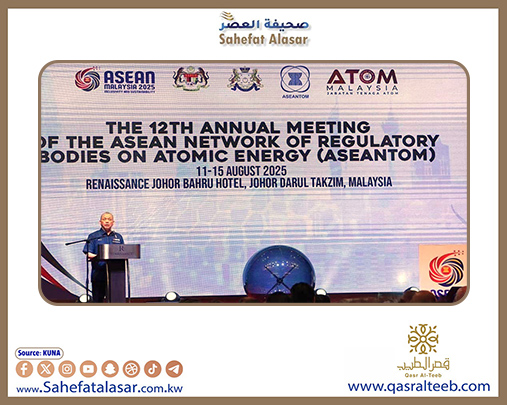


Malaysia today called on nuclear-armed states to promptly sign and ratify the protocol to the Southeast Asia Nuclear-Weapon-Free Zone Treaty (SEANWFZ), describing it as a fundamental pillar for regional peace, mutual confidence-building, and long-term security.
Malaysian Deputy Prime Minister Y.B. Dato’ Seri Fadillah Yusof, in his keynote address at the 12th Annual Meeting of the ASEANTOM (ASEAN Network of Regulatory Bodies on Atomic Energy), emphasized that "a robust and binding nuclear-weapon-free zone is crucial for maintaining stability and securing the region’s future." He reiterated Malaysia’s unwavering commitment to SEANWFZ and urged nuclear-weapon states to sign and ratify the protocol without further delay.
Yusof, who also serves as Minister of Energy Transition and Water Transformation, highlighted that the Malaysian government is conducting a comprehensive assessment to study nuclear energy as a potential option for clean, stable, and competitive electricity in the country’s future energy mix. This evaluation, aligned with Malaysia’s 13th Development Plan, aims to:
Diversify energy sources
Enhance long-term energy security
Reduce carbon emissions
Decrease reliance on fossil fuels
He also announced that the Malaysian Atomic Energy Licensing Board (AELB) will soon deploy the Gamma Spectrometry Water Monitoring System (GSWMS) under Malaysia’s 12th Plan. This advanced technology will strengthen the nation’s ability to detect and respond swiftly to potential radiological threats in water sources.
"The adoption of nuclear power and advanced technologies must be supported by strong regulatory frameworks, stringent safety protocols, and transparent international cooperation," Yusof stressed.
The Deputy PM added that ASEANTOM’s cooperation goes beyond technical collaboration—it is a strategic partnership reflecting a shared responsibility to ensure that nuclear energy serves sustainable development, regional stability, and the well-being of future generations.
Signed on 15 December 1995 by ASEAN member states, based on the 1971 Kuala Lumpur Declaration on a Zone of Peace, Freedom, and Neutrality (ZOPFAN).
Prohibits the development, manufacture, possession, testing, stationing, or use of nuclear weapons in Southeast Asia, covering land territories, airspace, territorial waters, and exclusive economic zones (EEZs).
The attached protocol requires the five nuclear-weapon states (China, France, Russia, the UK, and the US) to respect the zone’s status and refrain from using or threatening to use nuclear weapons against ASEAN members.
To date, none of the five recognized nuclear states have signed the protocol, citing concerns over:
Freedom of navigation
Geographical interpretations of the treaty’s coverage
Malaysia’s latest push underscores its commitment to a nuclear-free Southeast Asia while balancing the potential role of peaceful nuclear energy in its sustainable development strategy.